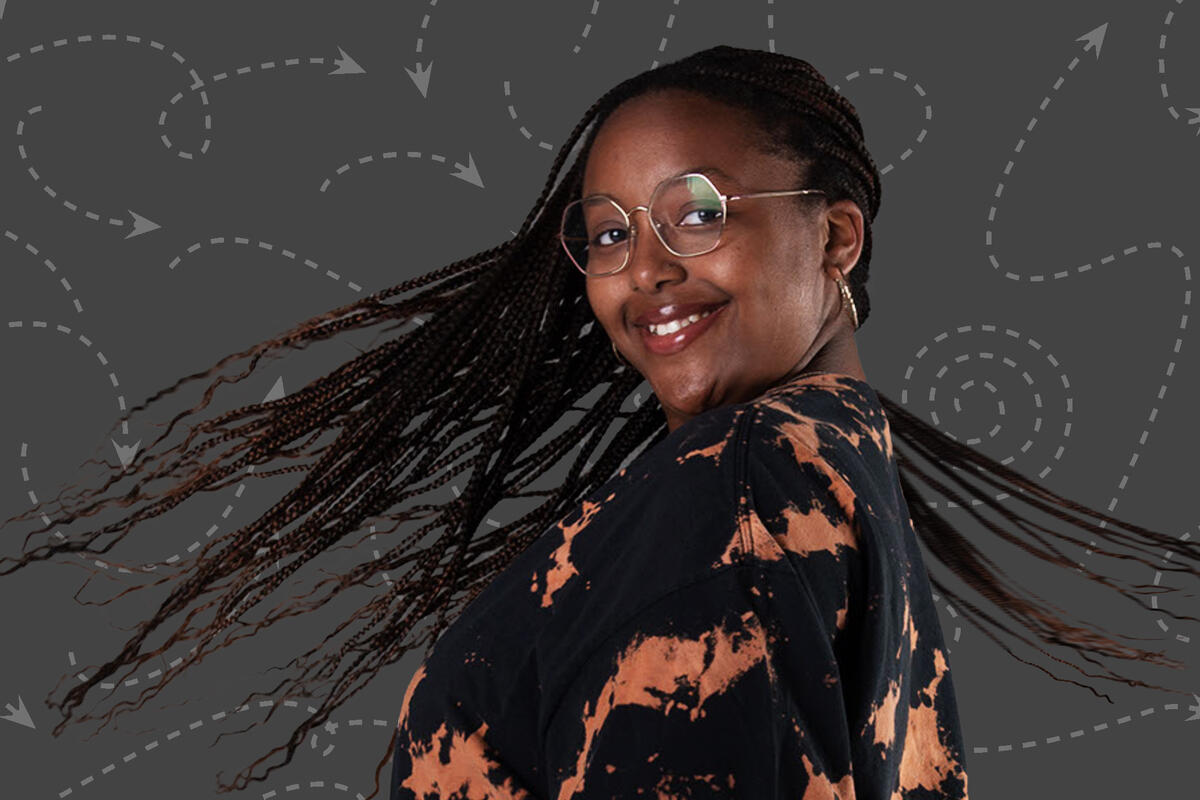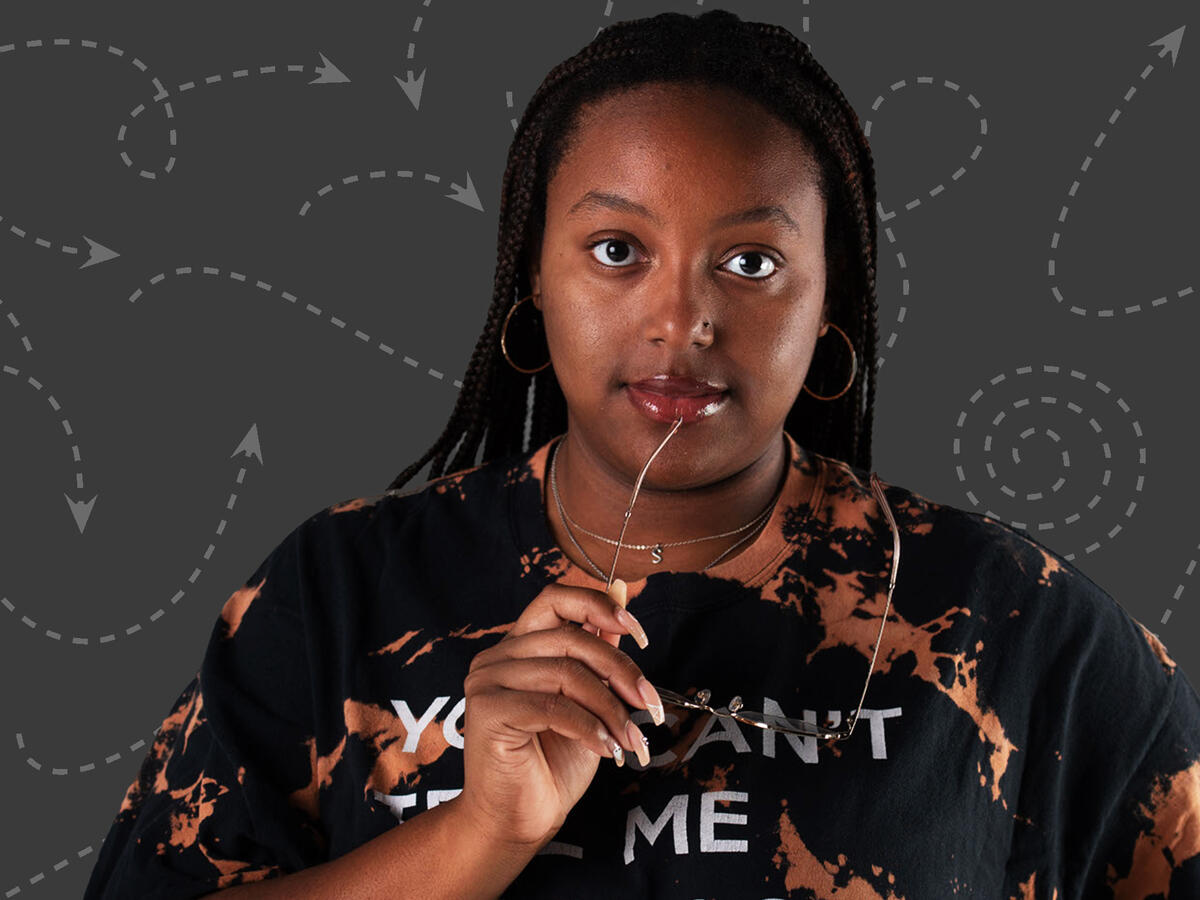
Nov. 17, 2022
‘A setback … just sets the tone for a greater comeback’
Share this story
About How I Turned It Around: In this series, students who’ve struggled academically and otherwise share insights, resources and stories of how they got back on track.
Sydney Wardrett wants to remind fellow and prospective students that college is hard. It wasn’t designed to be easy.
“There are so many factors that go into being a student,” said Wardrett, a sophomore majoring in English. “Not everyone has been awarded the luxury of no worries. I would be remiss to not acknowledge the fact that I was in a very fortunate position, where my worries were offloaded.
“Some people don’t have this. Some people are carrying a lot on their shoulders. So, if you see someone that appears to be carrying a lot, be patient. Be kind. The last thing they need is for something else to be added to that weight.”
Wardrett experienced that struggle firsthand her freshman year.
“The first semester of college was a true test of my strength,” she admitted.
Wardrett came to VCU with “preconceived notions.” She planned to be a social butterfly, at the top of her classes, and participate in all kinds of student organizations — all the things she hadn’t done in high school.
That did not go as planned.
It was “almost like life didn’t get the memo,” she said. “My freshman year was supposed to be the best year of my life. It wasn’t. It was a very hard year. A very lonely year. A very trying year.”
She had so many worries — too many. The first: how she would pay for school. On a more personal level, she worried about meeting new people and finding her community. She formed a few friendships, but they all ended terribly.
“Finding your community takes time,” she said. “So I stopped trying.”
All of those worries soon impacted her academics.
Wardrett had no delusions that college would be easy. She just didn’t think it would be as difficult as it was — especially as a freshman.
“I spent a lot of my time in my dorm,” she said. “I wasn’t going to class. I was barely submitting any assignments. I certainly succumbed to the fact that my ideal college experience wasn’t going to be my reality. I guess I can say now that I had completely given up on everything.”
It went downhill quickly, Wardrett said. She had moved into the dorm in late August and by the end of September, she hated everything.
“That span of time is such a blur to me, so I couldn’t tell you went wrong,” she said. “I just know that nothing was going right.”
The resulting 1.7 GPA that semester disappointed many people, herself most of all.

“When I got an email saying that I had been placed on an academic warning, that was … that was a moment,” she said. “I remember thinking, ‘How am I supposed to tell my mother this?!’ She sent me to college to thrive; I’m not really thriving right now.’”
Her mother, it turns out, was her saving grace. She was, of course, disappointed, but she had always told Wardrett that college was a choice.
“I contemplated on whether or not to return after winter break,” she said. “I didn’t want to. I didn’t know what I was doing here. If I’m just sitting in my dorm all day, not making new memories, not meeting those ‘forever friends,’ not going to the classes that I’m paying for … then why am I here? Was this really the right decision? Or had I convinced myself that it was?”
During winter break, Wardrett knew she needed to change her mentality if she was going to return. She admitted that she didn’t have a positive mindset because she didn’t like that things hadn’t gone the way she’d planned.
“It felt like I was the only person in my freshman class that was struggling,” she said, even though she knew that wasn’t true. “I didn’t like feeling like a failure. I didn’t like that I had disappointed my mom. I didn’t like that I had given up.
“After those feelings came to the forefront. I knew that I couldn’t go into another semester feeling this way. If I had any plans on turning everything around, I had to start mentally.”
Luckily, VCU has resources to help students such as Wardrett. The Department of Focused Inquiry in University College offers small, seminar-style classes for first- and second-year students as part of the core curriculum at VCU. Two people who helped Wardrett change her thinking were Nicole Fernandes and Michal Coffey.
Fernandes instructed her Foundations of Learning courses, which provide students with core competency skills necessary for academic success: communicative fluency, ethical reasoning, global and cultural responsiveness, information literacy and problem solving.
Coffey taught UNIV 191: Student Success Special Topics. The first-year course addresses motivators and barriers to student success. These courses are taught by academic advisers, financial aid counselors, campus leaders and student affairs professionals interested in connecting to first-year students based on their interests, fears, aspirations and career goals. Students who complete these courses historically earn higher GPAs and graduate faster with less debt.
More importantly, Coffey became Wardrett’s academic coach.
Similar to how a coach works with athletes to reach their fullest potential on the court or field, academic coaches help students reach their short- and long-term academic goals. The program is customized to each student’s needs to determine the most effective study strategies, identify and remove barriers, and provide them with the extra push they need to be successful.
Wardrett had what it takes to succeed with academic coaching: a strong desire to reach her academic goals, and the willingness to try new strategies to achieve them.
“There was a time during my first semester that I didn’t feel like I had that support, nor did I think I would have that support. Until I met these two women,” Wardrett said. “They have shown me grace. They were patient and understanding, even during the times that I took advantage of that. And I am forever grateful to have them in my corner.”
Today, Wardrett has a 2.9 GPA and is looking forward to graduating in 2025.
This experience has made her more patient.
“I’ve learned to understand that yes, I want my life to be a certain way but setbacks are inevitable,” she said. “And a setback isn’t the end of the world. It just sets the tone for a greater comeback.”
Subscribe to VCU News
Subscribe to VCU News at newsletter.vcu.edu and receive a selection of stories, videos, photos, news clips and event listings in your inbox.










